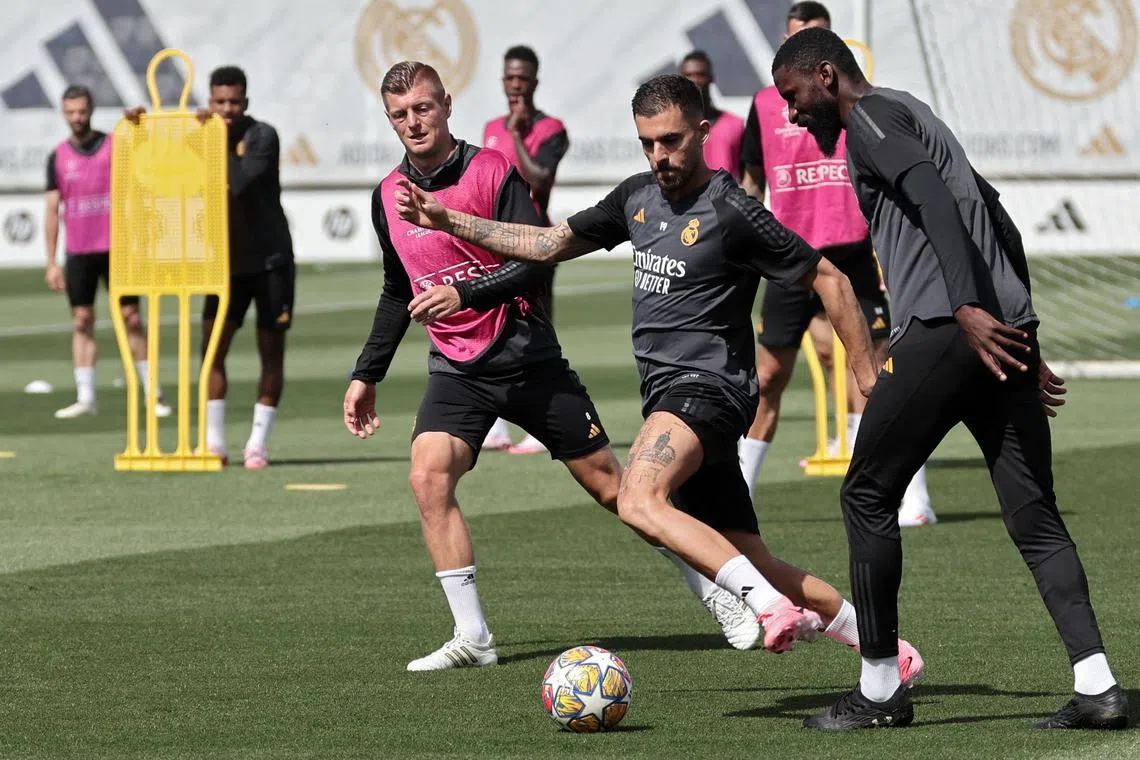Real Madrid’s Champions League aura masks fear behind Super League pursuit
Sign up now: Get the biggest sports news in your inbox

Real Madrid players train at the Santiago Bernabeu stadium in Madrid on May 27, ahead of their Champions League final against Dortmund.
PHOTO: AFP
Follow topic:
LONDON – The kings of the Champions League, Real Madrid go for a 15th European crown against Borussia Dortmund in the final on June 1, but the competition may cease to exist if the Spanish giants get their way.
Real and rivals Barcelona have pressed ahead in their wish to create a European Super League, defying the condemnation of the project from around the rest of the continent.
That includes from their opponents at Wembley this weekend, with Dortmund chief Hans-Joachim Watzke repeatedly stressing his club will have no truck with a Super League.
An initial attempt to launch a closed-shop breakaway league in 2021 collapsed within days after a backlash from fans, governments and the game’s authorities.
But supporters of the Super League have had a victory this week as a Madrid court found that world and continental governing bodies Fifa and Uefa had “abused their dominant position” and “prevented free competition” by opposing a breakaway league.
Real’s reasons for pursuing an earthquake in European football may seem confusing.
Los Blancos have won the Champions League five times in the past 10 years.
At the same time, they have managed to modernise the 85,000-capacity Santiago Bernabeu into a world-class stadium and remain a go-to destination for the planet’s best players.
Jude Bellingham was plucked from Dortmund 12 months ago for a fee in excess of €100 million (S$146 million) and Kylian Mbappe is expected to complete his move to the Spanish capital in the coming days from Paris Saint-Germain.
Real’s aura in the Champions League may strike fear into their competitors.
Yet, inside the club there is concern that their position as the competition’s most successful side could eventually come under threat without structural change to the sport.
For the first time last season, one of European football’s state-funded projects, the Abu Dhabi-backed Manchester City, lifted the Champions League – thrashing Real 5-1 on aggregate in the semi-finals.
City also benefit from the billions of pounds in television revenue that pours into England’s Premier League that has financially left Europe’s other major leagues trailing in its wake.
Dortmund feel that financial disparity even more keenly with a wage bill around one third of Real’s.
The German outfit have had first-hand experience of the difficulties in competing with state-backed clubs during their fairytale run to the final, for just the third time in their history.
Edin Terzic’s men saw off both PSG and Saudi-funded Newcastle in the group stage before beating the French champions once more in the semi-finals.
“We never complain that others spend more in their budget,” Dortmund managing director Carsten Cramer said.
“We are competitive even though the tools and weapons we have in our bucket are not the same.”
Dortmund may be able to draw inspiration from unfancied Italian Serie A side Atalanta, who shocked German champions Bayer Leverkusen in last week’s Europa League final to win their first-ever European trophy.
“It doesn’t always come down to cold hard numbers or Super Leagues but shows teams without huge budgets can achieve big things, said Atalanta boss Gian Piero Gasperini.
That may well be true, and miracles do happen. But Real are leaving nothing to chance as long as they compete with the likes of City and PSG. AFP, REUTERS

